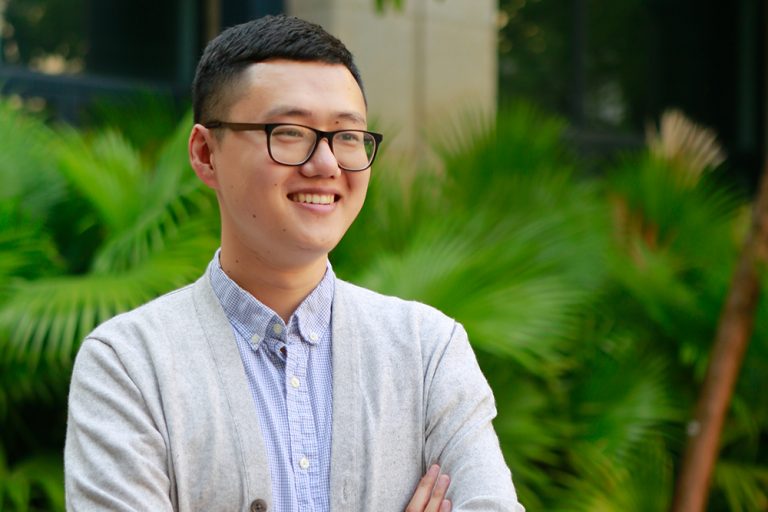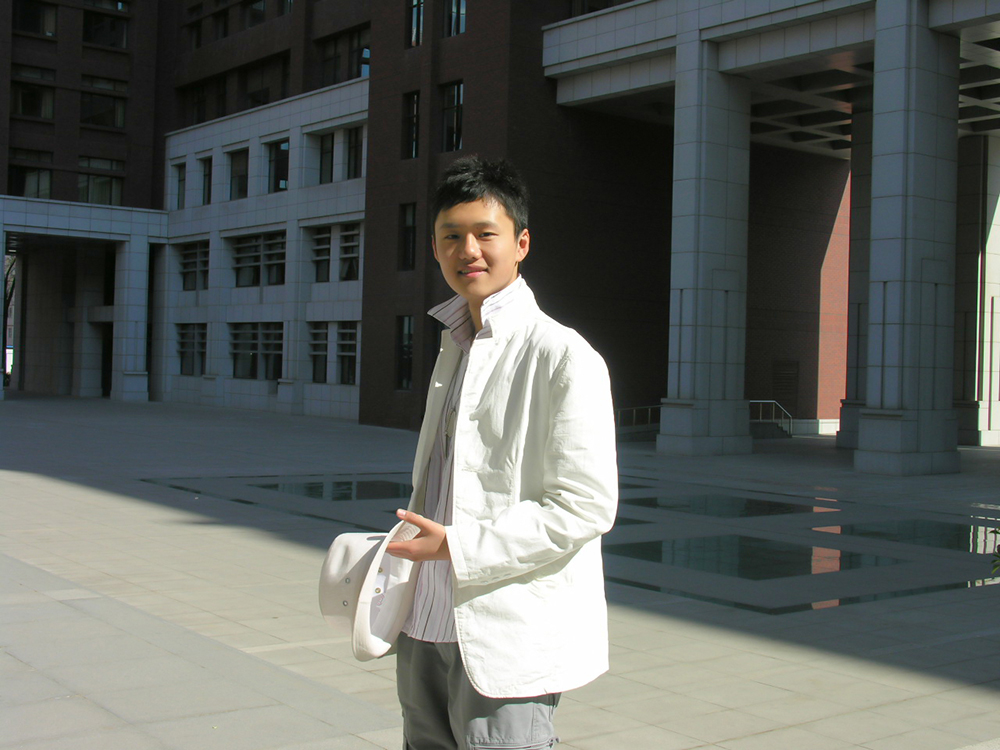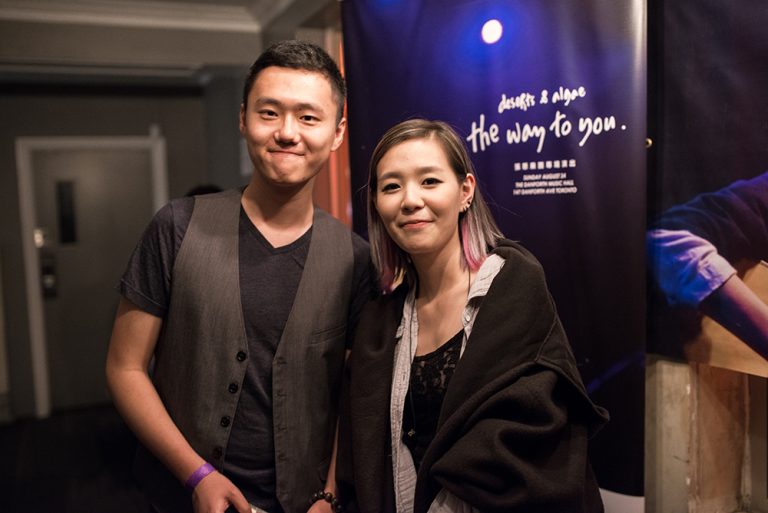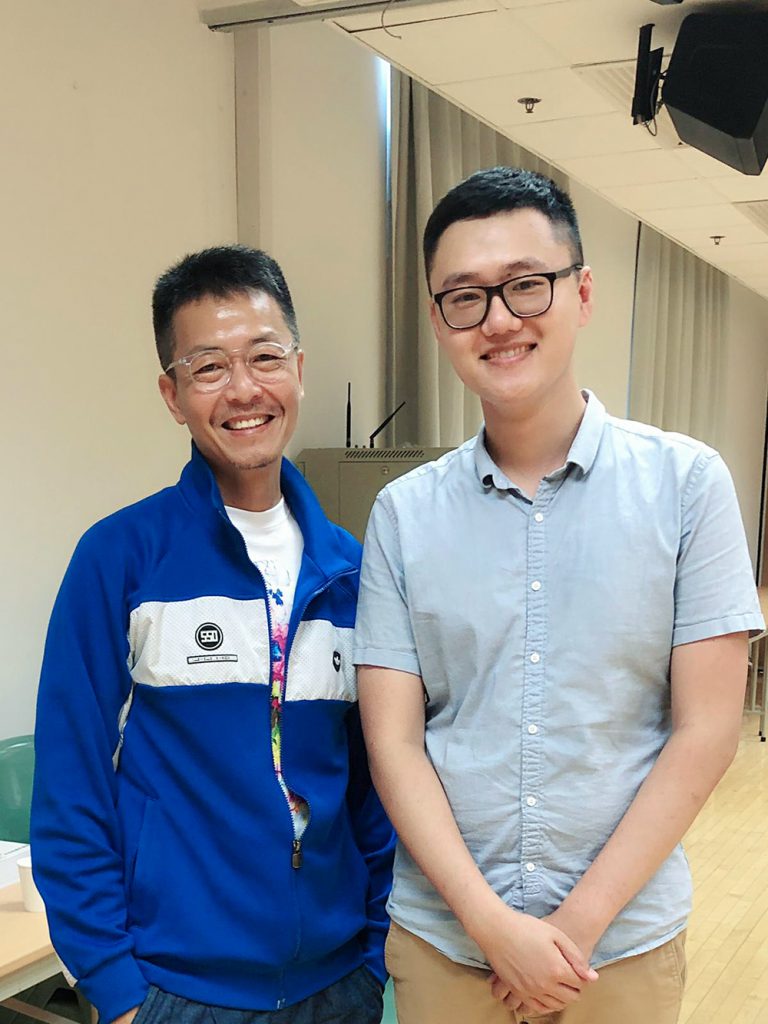Many people like pop music, but not many can become pop songwriters. Zhang Huiquan, an assistant professor in the Department of Sociology at the University of Macau (UM), began his lyricist journey by transcribing pop song lyrics and gradually developed a passion for writing lyrics himself. In addition to mainstream themes such as love, he also writes songs about social issues. Last year, he and some other songwriters in Macao wrote a theme song for the 20th anniversary of the handover of Macao, which also helped him learn more about Macao’s society.
Writing Lyrics for More Than 1,000 Songs
Prof Zhang has been a fan of pop music since junior high school, with songs by pop singers such as David Tao, Jay Chou, and Leehom Wang being his favourites. While studying sociology in his undergraduate years at Renmin University of China, he not only wrote song lyrics, but also participated in various singing competitions. Although immediately after graduation he went to the University of Toronto to pursue a doctoral degree in sociology, his passion for lyric writing did not wane. Since 2003, he has written lyrics for over 1,000 songs.
At some point, Prof Zhang began publishing his works on the internet. ‘Since I’m so passionate about creating, I should try to get more people to see my work,’ he says. In early 2016, several music producers saw his lyrics on the internet and approached him for commercial jobs. Soon, more invitations came his way. In August 2016, he released an interlude song titled ‘It’s a Good Thing You Didn’t Leave’ for the anime Spiritpact. In 2017, he wrote the theme song for the second season of the anime Under One Person. In 2018, he wrote the closing theme for the TV drama Yan Yang Chun. So far, he has written more than 50 theme songs or interlude songs for anime, films, and TV series.
As someone who grew up listening to pop music, Prof Zhang has always had one goal in mind. ‘I would like to have the opportunity to write song lyrics for Faye Wong,’ he says. ‘I just love her distinctive ethereal voice.’ Aware of his lack of professional training, he actively sought advice from industry professionals. A friend introduced him to Chow Yiu Fai, a lyricist who has worked with different Hong Kong singers, such as Anthony Wong Yiu Ming and Fiona Sit, as well as Yao Chien, a famous songwriter and music producer from Taiwan. Prof Zhang asked Chow and Yao to take a look at his works and give him some advice. ‘For people who never learned to properly write lyrics, there may be occasional geniuses who go off the beaten track, but most of these people would become mediocre because they lack systematic guidance,’ says Prof Zhang. Chowʼs encouragement remains a powerful motivation and a beacon of light for his transformation from a self-indulgent hobbyist to a professional lyricist.
Writing Lyrics about Social Phenomena
Prof Zhang says that he is inspired by a variety of things. ‘Some people may have a few thoughts after watching a film, but they are gone in a flash. If you put the idea into words, it can be expanded into a concrete work of art,’ says Prof Zhang, who has always been keen to study social phenomena and has touched on social issues in many of his works. He has published four articles in journals indexed by the Social Sciences Citation Index (SSCI) since joining UM at the end of 2019, including two on the impact of political status on well-being at different time periods in history, and two on citizen trust in government.
In addition, the epidemic has prompted Prof Zhang to contemplate social phenomena from a new perspective. ‘I was curious about the similarities between social and natural phenomena. For example, social emotions can spread like diseases. Criminals can imitate past criminal techniques, and perhaps protests can be contagious and spread,’ he says.
This alternative approach to exploring the similarities between social and natural phenomena is what he likes about sociology. His past research interests include public opinion, Chinese politics, quantitative research methods, and social movements. His academic background has given him a unique perspective on social issues and he likes to combine academia and art, using associations to incorporate social phenomena such as media chaos and wealth disparity into his lyrics.
Building Connections to Macao
Prof Zhang says that Macao has given him many inspirations. When he first came to Macao in 2019, the unique social environment and the atmosphere of the city left a deep impression on him. Later, he wrote a song titled ʻCityʼ, which depicts Macao’s dense population and high property prices: ‘We folded up the alleys / and built houses in the sky / we got trapped in golden cages / from the window to see the city lights.’
Prof Zhang describes ‘City’ as an attempt to bring together his understanding of sociology, life and love. In the song, he refers to changes in contemporary living patterns, the disconnection between people in Macao, and the increasing prevalence of electronic devices that have led to less and less face-to-face interaction. ‘We are isolated from each other and trapped in a towering cage. We are like millions of people on a subway, sitting next to each other but not knowing each other,’ says Prof Zhang.
Last year, he collaborated with Ken Sou Io Kuong, a UM alumnus who is also the president of the Macau Music Industry Association, to write lyrics for five songs on the theme of the 20th anniversary of Macao’s handover. He also wrote a love song about the Portuguese egg tart. In the future, he plans to learn more about the culture and history of Macao. He also hopes to work with and learn from other songwriters in Macao, learn to write lyrics in Cantonese, and create more songs about Macao.
喜歡流行曲的人不少,但能成為流行曲創作者的人卻不多。澳門大學社會學系助理教授張匯泉,從少年時代抄寫流行曲歌詞起,漸漸萌生對作詞的熱愛。他寫作的題材多樣,除愛情等主流題材外,他亦會創作與社會議題相關的歌詞,去年更與本澳音樂人一同創作紀念澳門回歸20週年的歌曲,通過創作進一步瞭解澳門社會。
業餘創作千首歌詞作品
談及最初喜愛音樂的緣起,張教授表示,初中階段就十分喜愛流行音樂,陶喆、周杰倫、王力宏等創作型歌手都是他那時的偶像。在中國人民大學修讀社會學時,擁有一把好嗓子的他在大學期間除了作詞外,亦積極參加各類型的歌唱比賽。大學畢業後,他隨即到加拿大多倫多大學攻讀社會學博士學位,他的作詞熱情並不因繁重的課業而減退。自2003年起至今,他共寫了逾千首詞。
「既然我有這麼高的創作熱情,應該嘗試讓更多人看到我的作品。」於是,張教授開始在網上發佈原創歌詞作品,並嘗試廣徵音樂人一道創作。2016年初,有幾位音樂人看到他的歌詞,向他發出合作邀約。此後,他的作品邀約不斷:2016年8月正式發表動漫《靈契》插曲《好在你沒離開》;2017年,為動漫《一人之下》第二季創作主題曲《無涯》;2018年,為電視劇《燕陽春》創作片尾曲《前塵》等。迄今他已有50多首作品被用作動漫、電影、電視劇的主題曲及插曲。
作為聽著流行曲成長的人,他一直朝著一個目標進發。「我希望有機會為王菲的歌填詞。我很喜歡她空靈的音色,過耳不忘。」他自覺不是傳統音樂科班出身,於是積極尋求業界人士的意見。經朋友介紹下,他認識了曾為香港歌手黃耀明、方大同、薛凱琪等作詞的周耀輝,以及台灣作詞人、製作人姚謙,常常向這些前輩請教。「對非科班出身的人來說,也許偶爾會有劍走偏鋒的天才,但大多數人因缺乏系統的指導而只能成為泛泛之輩。」前輩們的意見對張教授的寫作是莫大的鞭策和鼓勵。
把社會現象寫到歌詞裏
張教授的創作靈感來源多樣,「有的人看完電影後也許心裏有些想法,但很快就一閃而過。如果把想法組織成文字,就能進一步擴展成一件具體的作品。」張教授一直熱衷研究社會現象,不少作品涉及社會議題。他在2019年底加入澳大後已發表了四篇SSCI期刊論文,其中有兩篇分別探討政治地位在不同歷史時期對幸福感的影響,以及研究公民對政府的信任。
除此之外,疫情也令張教授以新的視角思考社會現象。他說:「我很好奇社會現象與自然現象的相似性,例如社會情緒也會像疾病那樣傳染,移植到我的學術領域以內,我會推想是否許多社會行為,諸如犯罪與抗議也可以在時空中蔓延和擴散。」
像這樣另闢蹊徑,探尋社會現象和自然現象之間的相似度,是他喜歡社會學的原因,他過往的研究主要包括公眾意見、中國政治、定量研究方法及社會運動等領域。他的學術背景讓他在看待社會議題時有其獨特的想法,他也試著融合學術與藝術,發揮聯想,將社會現象,例如媒體亂象、貧富分化寫到歌詞裏。
與澳門建立連結
張教授說,澳門為他在歌詞創作上帶來許多新靈感。2019年秋天,他剛剛來到澳門,對澳門獨特的社會環境與城市氣質十分感慨,並以此為題,創作了《城市》:我們折疊起了巷子/在天空搭起了房子/鎖住自己在昂貴的籠子/在窗台凝望這城市。刻劃了現代都會中人口綢密、樓價高企,乃至人際關係疏離的問題。
張教授形容《城市》是把他對社會學、生活及情愛的觀察和體會糅合比較緊密的一次嘗試。在《城市》裏,他提到了當代人居住形態的改變。澳門,乃至許多當代的大都會,人與人之間的聯繫被切斷,電子設備的普及,讓人與人之間越來越少面對面交流。他說:「我們彼此隔絕、圍困在高聳入雲的牢籠之中。我們在其中的情感越來越不純粹,人際關係越來越遙遠,就像地鐵上的千百萬原子化的個體,人們緊挨著彼此坐,卻誰也不認識誰。」
去年,張教授結識了澳大校友、澳門音樂產業協會會長蘇耀光,並且合作發表了兩首以澳門回歸20週年紀念為主題的歌詞;他甚至還創作了與葡撻有關的一首愛情歌曲。未來,他亦打算多瞭解本土文化和歷史,多與澳門本土音樂人交流合作,學習粵語填詞,多創作與澳門相關的作品。
(Source: My UM ISSUE 99, Communications Office, UM)





